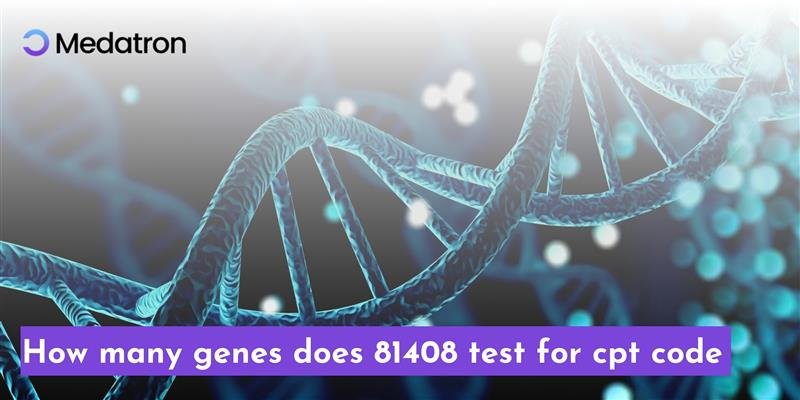Genetic testing has grown exponentially over the past few decades. Today, with the help of PGx testing of RPh Labs, it’s possible to explore genetic contributions to health, disease, and drug response. One of the several tests available is the 81408 test, which is known to screen for thousands of genes. Let’s see how many genes does 81408 test for and how it’s done.
What is the 81408 Test?
The 81408 code is a descriptor in the Current Procedural Terminology (CPT) system maintained by the American Medical Association. The code falls under the class of molecular pathology procedures that belong to Tier 2 molecular pathology. The codes of genetic tests classify them according to the complexity of analysis and the resources needed for the process.
Gene Coverage of the 81408 Test
The 81408 test is one of the highest-tier codes, meaning it is used for complex genetic analyses. Specifically, it covers tests that analyze multiple genes or loci for specific mutations associated with high clinical significance. Although the exact number of genes covered can vary depending on the laboratory and the particular test panel offered, it’s not unusual for tests billed under 81408 to include hundreds or even thousands of genes.
Some examples of conditions for which 81408 might be used include:
- Comprehensive cancer panels (e.g., BRCA1/BRCA2 alongside other high-risk cancer susceptibility genes).
- Whole exome sequencing (WES) analyzes all coding regions of the genome.
- Extensive panels for rare genetic disorders, including those affecting the nervous system, cardiovascular health, or immune function.
What Determines the Gene Count?
Several factors determine how many genes does 81408 test for:
- Test Type: Whole exome sequencing or large multigene panels typically examine thousands of genes, while smaller targeted panels may focus on dozens or hundreds.
- Purpose of the Test: A test to detect rare inherited diseases might analyze a different set of genes from one designed for cancer risk or pharmacogenomics.
- Laboratory Technology: Different laboratories use different platforms for sequencing and analysis, which can influence the number of genes included in the test. Advanced next-generation sequencing (NGS) platforms like RPh Labs can efficiently analyze vast portions of the genome.
- Insurance and Billing Practices: The scope of the test may also depend on the insurance coverage and the specifics of the patient’s clinical situation. The 81408 code usually applies where the test requires the utmost technical expertise, time, and resources.
Why is the Gene Count Important?
Knowledge of the number of genes assessed is essential to interpreting a result and the range a test can scan. A larger panel enhances the chances of picking any variation of interest yet may make the data overwhelming to interpret. Conversely, targeted panels provide precise data but might miss variations of interest outside this panel.
Role of Pharmacogenomics Labs in 81408 Test
Pharmacogenomics (RPh) labs play a key role in the 81408 test by using sophisticated genetic-testing technologies to identify how specific genetic variations can impact medication responses. In 81408, for some tests that may require analysis with large-scale techniques, for example, whole exome sequences or comprehensive panels for very complex conditions, RPh labs apply such insights to help tailor treatments to an individual’s genetically profiled status. It would increase the efficacy of drugs, reduce adverse reactions, and help clinicians make the best drug decisions relating to diseases such as cancer, cardiovascular diseases, or neurological disorders. In such a manner, genetic insights that these RPh labs come up with contribute towards personalized medicine because treatments would be tailored to fit into each patient’s genetic makeup.
How Medatron Simplifies the 81408 Test with Insurance and Billing Practices
Medatron simplifies the 81408 test by making optimal insurance and billing practices for the complex genetic analysis while ensuring that the required complexities are met with the different insurers. The advanced software and streamlined workflow in Medatron help the laboratories understand the various intricacies of insurance coverage, and it helps bill accurately based on the particular clinical context and the type of test panel used. The system prevents the wrong billing codes by reducing administrative errors and ensures reimbursement for high-complexity tests such as the 81408. Therefore, Medatron minimizes delays and maximizes the chances of timely and accurate reimbursement, making billing more efficient for patients and healthcare providers.
Medatron offer reliable medical billing services, ensuring accurate processing of CPT code 81408 for advanced genetic testing.
Conclusion
The 81408 test is a giant step forward in genetic testing. It includes an in-depth analysis of many genes involved in complex conditions such as cancer, rare genetic disorders, and pharmacogenomics. Being able to examine hundreds or even thousands of genes, the 81408 test offers significant information that assists in designing individualized treatment plans. Factors such as the type and purpose of the test, as well as laboratory technology, decide upon the number of genes for analysis, making it bespoke for each patient’s treatment. Pharmacogenomics laboratories and streamlined technologies, including Medatron, make such an analysis more efficient and effective, thus further improving the clinician’s decision and the patient’s outcomes. As genetic testing continues to evolve, the 81408 test is a powerful tool in advancing precision medicine.







